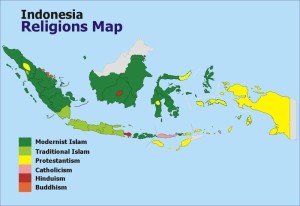Indonesia's ISIS Dilemma
As the specter of ISIS looms across the globe, Indonesia’s national security is on high alert as approximately 500 of its citizens have reportedly crossed into ISIS territory. Home to the world’s largest Muslim population, Indonesia’s security interests align with those of the West. Yet, for all its war on terror and its leadership at the forefront of counter-terrorism, a gaping hole has been left unaddressed - a legal framework against terrorism which extends only up to Indonesia’s borders. In December 17 of last year, a man identified as Suyatno and eleven other Indonesians were stopped by Malaysia Customs when they were suspected of associations with ISIS. Suyatno’s subsequent arrest should have been beyond question; he was an ex-convict that had already served a term in prison for a armed bank robbery in Northern Sumatra. What is appalling, however, is that Suyatno’s imprisonment was due to a separate act of terrorism and not his links to ISIS. The remaining 11 nationals, also consisting of women and children, were acquitted. The fundamental problem is a lack of legal recognition of ISIS as a terrorist organization. Unless arrested suspects have no other charges linked to other groups, their connection to ISIS alone is insufficient to land them behind bars.
Today, Indonesians who have joined ISIS come from largely two groups. The first are products of homegrown terrorism, those who have engaged in terrorist activities at home, and then flew to Syria en route from Turkey. The other is a blend of overseas professionals and students studying abroad that have been drawn to ISIS ideology and entered the territories directly from their countries of residence. Prior to the Islamic State, Syria had an established Indonesian population, most of whom worked menial jobs and were drawn to the financial opportunities there. To combat a growing ISIS threat, the government would need to extradite apprehended citizens in foreign countries, and investigate those within Indonesia that harbor extremist sympathies. Unfortunately, the current anti-terror law enables neither; the National Counterterrorism Agency (BNPT) is at a loss over rudimentary details such as the exact number of Indonesians who have traveled to Syria, or those that have returned home.
Wary of this loophole, the Indonesian government under President Joko Widodo has made a number of frustrated attempts at reforming the 2003 Anti-Terrorism Law. Most notably, it pushed for the revoking of passports of citizens found to support the Islamic State in January this year. The regulation was a reaction to six of its citizens trying to leave for Syria on forged documents. By implementing the regulation, the administration was trying to curb the future repatriation of radicalized citizens; efforts, sadly, have been stalled. “The government must first pass a regulation that clearly bans anyone from joining any organization that promotes violence to achieve its goal,” terrorism analyst Adhe Bhakti observed, “otherwise revoking the passports of ISIS supporters would have weak legal grounds.”
While patiently waiting for a “tougher approach”, the Indonesian government has shifted its attention to the inadequacies of its prison system. The country’s failure to monitor convicts such as Aman Abdurrahman - now an influential ISIS figurehead - has cost it dearly. The situation was so bad that Abdurrahman had access to the internet at certain points of his term at his maximum security prison, which enabled him to disseminate political statements. Tightening security in the future will entail heavily reduced prisoner access to visitors as well as closer monitoring, both of which the administration agree will discourage radical activities.
Despite the best of intentions, much more should be expected of the Indonesian government when it comes to combating ISIS. As one of the world’s largest democracies, the civil liberties provided by the nation has made it easy for ISIS supporters to circumvent the government radar. Constructive ideas such as deradicalization measures should be discussed, but talk alone is simply not enough.

